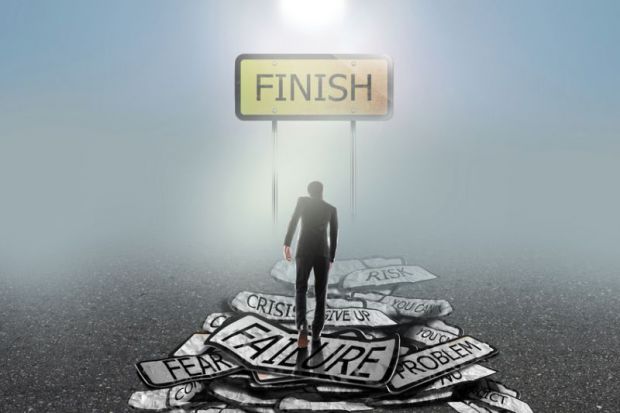
International Day for Failure, celebrated on October 13th, aims to embrace and learn from our mistakes. It encourages individuals and organizations to see failure as a stepping stone towards growth and innovation.
Embracing failure helps build resilience, fosters creativity, and ultimately leads to success. By acknowledging and reflecting on our failures, we gain valuable insights that can drive improvement and future achievements. This day serves as a reminder not to be discouraged by setbacks but to use them as opportunities for self-improvement and personal growth.
Celebrating failure allows us to normalize the concept, reduce stigma, and create an environment of open-mindedness and continuous learning. So, let’s embrace failure, learn from it, and ultimately turn it into success.
The Origins And Significance Of International Day For Failure
International Day for Failure is a day dedicated to recognizing and embracing failures as crucial elements of personal and professional growth. This unique day originated from a desire to challenge societal norms surrounding success and failure.
It aims to shift the negative connotations associated with failure and instead encourage resilience, innovation, and learning. Founded by an international team of thought leaders and influencers, the day serves as a platform to share stories of failure, celebrate the lessons learned, and inspire others to view failure as a stepping stone toward success.
International Day for Failure is an opportunity to reflect on past experiences, acknowledge mistakes, and acknowledge the importance of taking risks. By fostering a culture of acceptance and understanding, this day inspires individuals and organizations to embrace failure as an inevitable part of the journey toward progress and achievement.
Embracing Failure: A Culture Of Growth Mindset
The International Day for Failure is an annual event that promotes a growth mindset culture, encouraging individuals to embrace failure as an essential part of personal and professional development. Failure is often viewed negatively, but its power lies in the lessons and opportunities it presents.
Through failure, we gain valuable insights, sharpen our skills, and learn resilience. In those moments of setbacks, we truly discover our strengths and capabilities.
Transforming failure into opportunity is a vital aspect of fostering a growth mindset. Many great success stories have emerged from individuals who have experienced failure and used it as a launching pad for innovation and improvement. These inspiring tales serve as reminders that failure is not the end but rather a stepping stone toward success.
In embracing failure, we can create an environment where risk-taking and experimentation are valued. This mindset encourages continuous learning, adaptability, and creativity. It enables individuals and organizations to push boundaries, overcome challenges, and reach new heights.
Let us celebrate the International Day for Failure by reflecting on our own experiences and the lessons they have taught us. Together, we can shift the narrative around failure and embrace it as a catalyst for growth and achievement.
Activities And Events On International Day For Failure
On International Day for Failure, various activities and events aim to promote learning from failure and celebrate the value of setbacks. Engaging workshops and seminars provide opportunities for individuals to reflect on their own experiences and gain insights from others.
These events encourage participants to boldly share their stories of failure, highlighting the lessons learned and the growth achieved as a result. Through storytelling, individuals can inspire and motivate others, fostering a culture of learning and resilience.
This day serves as a reminder that failure is not something to be feared or avoided but embraced as a natural part of the journey toward success. By acknowledging and learning from our failures, we can strive for continuous improvement and achieve greater personal and professional development.
Failure As A Stepping Stone: Learning From Mistakes
Failure is often seen as a negative experience, but it can actually be a valuable tool for growth and development. By learning from our mistakes, we can develop resilience and grit that will help us overcome future challenges. Building the confidence to face failure head-on can be difficult, but through perseverance and a growth mindset, we can embrace failure as a stepping stone towards success.
One way to overcome the fear of failure is to develop strategies that allow us to learn from our mistakes. This includes reflecting on what went wrong, identifying areas for improvement, and implementing changes to our approach. By viewing failure as an opportunity for learning and growth, we can break free from fear and confidently embrace new challenges.
Another important aspect of using failure as a tool for improvement and innovation is the ability to adapt and make necessary changes. Rather than giving up after a setback, we can analyze the situation, brainstorm new ideas, and make adjustments to our plans. This flexibility and willingness to try again in the face of failure can lead to breakthroughs and innovative solutions.
Failure In Various Fields: Lessons From Industries And Innovators
Failure is a universal experience that transcends industries and disciplines. Entrepreneurs and leaders have shared their stories of failure and the valuable lessons they have learned from them. These stories serve as valuable sources of inspiration and motivation for others who may be facing their own challenges.
Famous entrepreneurs and leaders, including Steve Jobs and Elon Musk, have openly spoken about the failures they encountered on their path to success. These failures have taught them resilience, perseverance, and the importance of taking risks. Their stories highlight the power of embracing failure as a stepping stone towards growth.
In the field of science and innovation, failure is an integral part of the process. Many significant scientific discoveries and inventions have occurred due to failed experiments and hypotheses. Thomas Edison, for example, famously remarked, “I have not failed. I’ve just found 10,000 ways that won’t work,” referring to his extensive experimentation with the light bulb.
The International Day for Failure celebrates the importance of failure in personal and professional development. It encourages individuals to embrace failure as an opportunity for learning and growth. By reframing failure as a valuable experience, we open ourselves up to new possibilities and the chance to achieve even greater success in the future.
Failure And Mental Health: Nurturing A Positive Mindset
Failure is an inevitable part of life, and how we react to it can greatly impact our mental well-being. Understanding the psychological impact of failure is crucial in nurturing a positive mindset. Failure often leads to feelings of disappointment, self-doubt, and even depression. However, practicing self-compassion and maintaining a positive outlook is important to overcome these challenges.
Strategies for self-compassion involve treating ourselves with kindness and understanding rather than being overly critical. This can be done by reframing our thoughts and focusing on our strengths and accomplishments. Additionally, surrounding ourselves with a supportive network of friends and family can help boost our confidence and maintain a positive mindset.
Developing a positive outlook involves cultivating optimism and resilience. This can be achieved by setting realistic goals, celebrating small victories, and learning from failures. Seeking professional help from therapists or counselors can also provide valuable insights and techniques to cope with failure and maintain good mental health.
Failure In The Digital Age: Embracing The Journey Of Trial And Error
Embracing failure has become a crucial aspect of the digital age, particularly in the ever-evolving world of technology and startups. The rapid pace of innovation demands a willingness to take risks, experiment, and accept that failure is an inevitable part of the journey toward success. To stay competitive, businesses must foster a culture that encourages and values trial and error.
Experimentation is at the heart of digital innovation. Startups and tech companies understand that failure is not something to be feared but rather an opportunity for growth and learning. By embracing failure and viewing it as a valuable asset, these organizations can iterate, pivot, and ultimately find the winning formula to propel them forward.
Embracing failure also means accepting that not every idea will work out. In the digital age, success often comes from taking bold risks and pushing boundaries. However, balancing experimentation with a strategic approach is important, ensuring that failures are used as stepping stones toward future success.
Ultimately, failure is not the end but rather a necessary part of the journey to innovation and success in the digital age.
Failure In Education: Encouraging Risk-taking And Growth
Failure is often seen as something to be avoided and feared, especially in the context of education. However, there is a growing recognition that failure can actually be a valuable learning experience. By reframing failure as an opportunity for growth and development, educators can encourage students to take risks and push their boundaries.
Creating supportive environments is crucial in this process. Students need to feel safe and supported in taking risks and making mistakes. This can be achieved by fostering a growth mindset, where students understand that intelligence and abilities can be developed over time. Encouraging open and honest communication is also important, allowing students to reflect on and learn from their failures.
Teachers play a key role in helping students navigate failure. They can provide constructive feedback and guidance, helping students understand where they went wrong and how to improve. Praise for effort and perseverance rather than just success can also motivate students to embrace failure as a stepping stone toward success.
Ultimately, we can create a culture that celebrates risk-taking and growth by reimagining failure as an integral part of the learning process. Embracing failure in education prepares students for real-world challenges and fosters resilience and a love of learning.
Failure As A Catalyst For Change: Social And Environmental Impact
Utilizing failure as a catalyst for change can significantly impact social and environmental issues. When facing setbacks in pursuing sustainable development, it is crucial to acknowledge and learn from these experiences rather than allowing them to discourage progress. Failures can present valuable opportunities for growth and innovation, pushing us to reconsider existing approaches and find new solutions.
One of the key aspects of using failure as a motivation for change is the ability to adapt and pivot. By openly acknowledging and analyzing failures, individuals and organizations can gain crucial insights into what went wrong and identify areas for improvement.
These experiences can help to refine strategies and develop more effective approaches that address the root causes of societal and environmental challenges. Embracing failure fosters a culture of continuous learning and encourages collaboration and the sharing of lessons learned, allowing others to avoid similar pitfalls.
Moreover, failure can spark creativity and inspire unconventional thinking. When conventional methods fall short, exploring alternative approaches and experimenting with innovative solutions becomes necessary.
Failures encourage us to think outside the box and challenge established norms, paving the way for groundbreaking ideas and breakthroughs. They provide us with the determination and motivation to question the status quo, leading to transformative change that can impact society and our planet.
Embracing failure as a catalyst for change enables us to address social and environmental issues with renewed vigor and resilience. By learning from our mistakes and using them as stepping stones towards progress, we can create a more sustainable and equitable future for all.
Embracing Failure: Tips And Strategies For Personal Growth
Embracing failure is an essential aspect of personal growth. It involves cultivating a growth mindset and employing practical techniques and exercises. Building resilience and bouncing back from setbacks are key skills to develop in this process.
A growth mindset recognizes failure is not an endpoint but a stepping stone towards success. It involves reframing failures as opportunities for learning and growth. By embracing failure, individuals can develop resilience and adaptability, which are crucial in navigating life’s challenges.
One practical technique to cultivate a growth mindset is reframing negative experiences. By focusing on the lessons learned and the personal growth achieved, individuals can transform failure into a valuable stepping stone toward success.
Another effective exercise is setting realistic goals and breaking them down into manageable steps. Celebrating small victories helps build confidence and maintain motivation, even in the face of setbacks.
Moreover, seeking feedback and learning from mentors or like-minded individuals can provide valuable insights and different perspectives. Embracing failure as an opportunity for growth is a continuous process that requires self-reflection, perseverance, and a willingness to step outside of one’s comfort zone.
International Day For Failure: Spreading The Message Worldwide
The International Day for Failure is an annual event to celebrate and embrace the concept of failure. With global initiatives and events, this day promotes the importance of embracing failure and shifting the perspective around it.
Social media plays a vital role in raising awareness and engaging communities today. Through various platforms, individuals and organizations can share their stories of failure, highlighting the lessons learned and the growth that can come from it. Social media also allows for dissemination of resources and information related to failure, empowering individuals to overcome their fear of failure and take risks.
Global events and initiatives are organized to bring together individuals from different backgrounds and industries, creating spaces for open discussions and dialogues around failure. These events provide networking, learning, and collaboration opportunities, fostering a supportive environment that encourages innovation and risk-taking.
| Benefits of International Day for Failure | Opportunities for Engagement |
|---|---|
| Shifts perspective on failure | Sharing personal stories on social media |
| Promotes innovation and risk-taking | Participating in global events |
| Encourages growth and learning | Engaging in open discussions |

Credit: www.listofnationaldays.com
Frequently Asked Questions For International Day For Failure
Is October 13th The International Day For Failure?
No, October 13th is not the International Day for Failure.
What Is International Day For Failure?
International Day for Failure is a global event celebrating the lessons, growth, and innovation that can come from embracing failure. It encourages people to see failure as a stepping stone to success and to learn from their mistakes.
When Is International Day For Failure Celebrated?
International Day for Failure is celebrated on October 13th each year. It is a day dedicated to acknowledging and embracing failure, encouraging individuals and organizations to learn from their experiences and grow stronger.
Why Is International Day For Failure Important?
International Day for Failure is important because it helps to destigmatize failure and promote a healthy attitude towards it. By celebrating failure, we encourage innovation, risk-taking, and growth. It reminds us that failure is a natural and necessary part of the journey to success.
Conclusion
Celebrate failures on the International Day for Failure, as it reminds us that success is not the absence of failure but rather the ability to learn and grow from it. Embracing failure empowers us to take risks and push boundaries, opening doors to innovation and personal growth.
Remember, failure is not an end but a stepping stone on the path to success. So, let’s celebrate failure, embrace the lessons it offers, and strive for greatness.





